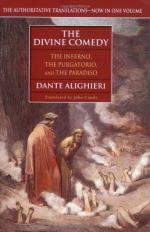|
This section contains 8,345 words (approx. 28 pages at 300 words per page) |

|
SOURCE: “The Poem's Center (Purgatorio XII-XVIII)” in Dante's Political Purgatory, University of Pennsylvania Press, 1996, pp. 144-57.
In the following essay, Scott emphasizes the elements of Cantos XII to XVII that show Dante's political hopes and beliefs, particularly the idea that both political and spiritual spheres can harmoniously coexist on earth.
Pride is at the root of all sin (Eccles. 10. 15), and the Pilgrim will soon declare how heavily this sin weighs down his soul (Purg. XIII. 136-38). Once more, the number three is in evidence, when Dante encounters Omberto Aldobrandeschi, Oderisi da Gubbio, and Provenzano Salvani in Canto XI. The first is an exemplum of overweening pride, typical of the feudal aristocracy. Omberto belonged to the powerful Aldobrandeschi clan, Counts of Santafiora and lords of the Sienese Maremma (cf. Purg. VI. 111). His hubris led to his death, when he took on an invincible number of adversaries:
“L’antico sangue...
|
This section contains 8,345 words (approx. 28 pages at 300 words per page) |

|


